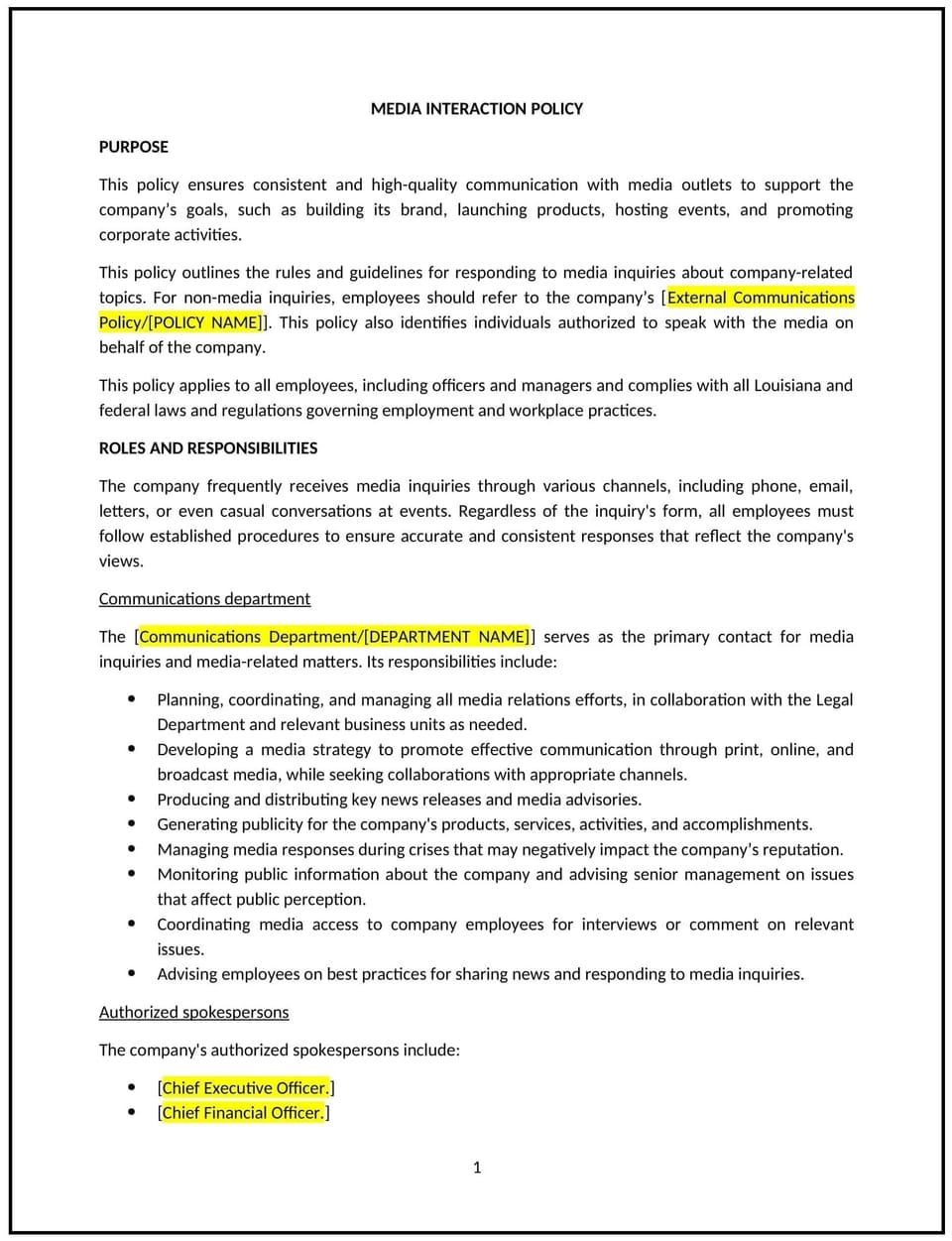Media relations policy (Louisiana): Free template

Media relations policy (Louisiana)
This media relations policy is designed to help Louisiana businesses manage interactions with the media effectively. It outlines guidelines for communicating with journalists, handling inquiries, and maintaining a consistent and professional public image.
By implementing this policy, businesses can safeguard their reputation, ensure accurate messaging, and build strong relationships with the media.
How to use this media relations policy (Louisiana)
- Define spokesperson roles: Identify authorized individuals responsible for speaking to the media, such as senior leaders or designated communication professionals.
- Establish approval processes: Specify how press releases, interviews, and other media communications should be reviewed and approved.
- Include response procedures: Provide steps for handling media inquiries, including directing questions to the appropriate spokesperson.
- Address confidentiality: Emphasize the importance of protecting sensitive or proprietary information during media interactions.
- Outline media engagement opportunities: Highlight acceptable scenarios for initiating media contact, such as product launches or community events.
- Communicate social media alignment: Ensure media messaging aligns with official social media communication guidelines.
Benefits of using a media relations policy (Louisiana)
Implementing this policy provides several advantages for Louisiana businesses:
- Protects reputation: Promotes consistent and professional communication with the media.
- Reduces misinformation: Ensures accurate and approved messaging is shared publicly.
- Streamlines processes: Establishes clear procedures for managing media inquiries and engagements.
- Builds trust: Demonstrates transparency and professionalism in media interactions.
- Reflects Louisiana-specific considerations: Adapts to local business practices and media dynamics.
Tips for using this media relations policy (Louisiana)
- Train spokespeople: Provide training on handling media interactions professionally and effectively.
- Use pre-approved templates: Develop templates for press releases and key messaging to ensure consistency.
- Monitor media coverage: Track how the business is portrayed in the media and address inaccuracies if necessary.
- Foster relationships: Build positive connections with local media representatives to enhance coverage and trust.
- Update regularly: Revise the policy to reflect changes in media practices or business priorities.
Q: Who is authorized to speak to the media under this policy?
A: Only designated spokespeople, such as senior leaders or communication professionals, are authorized to interact with the media.
Q: How should employees handle unsolicited media inquiries?
A: Employees should direct all media inquiries to the designated spokesperson or communication team and refrain from commenting themselves.
Q: What types of information should not be shared with the media?
A: Confidential or proprietary information, such as financial data, trade secrets, or employee details, should not be disclosed to the media.
Q: How can businesses prepare for media interviews?
A: Businesses should review key messages, rehearse responses, and anticipate potential questions to ensure professionalism and accuracy.
Q: What steps should be taken before issuing a press release?
A: Press releases should be reviewed and approved by the designated communication team or senior leaders to ensure accuracy and alignment with business goals.
Q: How often should this policy be reviewed?
A: The policy should be reviewed annually or when significant changes occur in media practices or business operations.
Q: Can employees share media coverage on personal social media?
A: Employees may share media coverage, but they should avoid adding personal commentary that could conflict with the company’s messaging.
This article contains general legal information and does not contain legal advice. Cobrief is not a law firm or a substitute for an attorney or law firm. The law is complex and changes often. For legal advice, please ask a lawyer.


